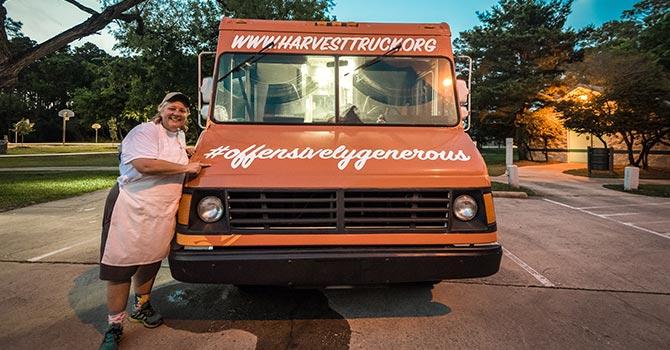We’ve explored the phenomenon of food trucks in ministry before (here, here, here, and here). We also took a look at a debate within economic the economic development world between people or location based strategies and how it might apply to churches;
“There’s a raging debate about whether the focus of our economic development efforts should be on people or on places. That is, should we make investments in people, hoping to see them succeed regardless of where they end up? Or should we focus on investments in particular cities, towns and rural areas in order to bring jobs and growth, thus helping the people who live there?
How [does] the church allocates its resources – do we follow people-based or location-based strategies? Much like cities, I think, we tend to favor locations, that is existing institutions. We see it in the propping up of struggling parishes, seminaries or even whole dioceses. Unlike cities, we don’t often engage in speculative development like building new stadiums, but we will spend to fix up facilities or prolong an institution even when it has experienced long-term decline. Bi-vocationality and multi-point parishes also seem to me to be a kind of location-based strategy that seeks to perpetuate the paradigm of the village parish church.
Reflecting on Jesus’ own ministry though, I see a people-based strategy of traveling light, taking the Holy into the world.”
Faith and Leadership, an online journal from Duke University has an article highlighting an Episcopal ministry that is a food truck, plus a whole lot more. A mission of Trinity Episcopal Church, in The Woodlands, a suburb north of Houston that is aiming to do R&D around that ideas of taking Christ (the church) into the world. The effort is called St Isidore, (patron saint of farmers and the internet) and is led by the Rev Sean Steele, who explains that St. Isidore is one church that embodies itself in many different ways. It’s a Taco Church, house churches, a pub theology group, a free laundry ministry, a food truck and more. At the same time, the liturgy is distinctly Episcopalian.
“Steele holds tightly to Episcopal liturgy even as he brings it into novel settings such as breweries and laundromats. St. Isidore is aimed not just at unorthodox places, he said, but also at unorthodox people, like the formerly Daoist chicken farmer who now runs the pub theology group.
“I’m trying to think about the people who aren’t going to a church on a Sunday morning,” Steele said. “I’m not interested in getting Christians that are already Christian.””
Steele seems to want to do away with the idea of “doing outreach;” and instead is seeking to manifest the body of Christ in a way that more fully intertwines mission and sacrament than the traditional parish model with its Sunday services and mission projects that occur separately and often without significant involvement from worshipers. Steele’s goal is to be “offensively generous,” he says.
Perhaps the underlying theme of St Isidore is to find where community already happens and to bring Christ into that.
“Where are people already acting like church, but they’re not calling it church?” Steele said. “Where are people looking for meaning and identity and belonging and relationship and hope, but they’re not calling it church?”
The effort began two years ago, when Steele began devoting ten hours per week to dreaming, research, and planning.
“That March, a lay staff member mentioned half-jokingly that she wanted to do outreach with a free food truck. Steele jumped at the idea and started the fundraising; the food truck manufacturer became a major contributor.
The first ministry group, Pub Theology, began as an experiment in August 2015. Like similar gatherings nationwide, it attracted an eclectic mix of believers and nonbelievers across several generations. Some of them also joined other St. Isidore activities as they launched, while some just came out for the Tuesday night beer-and-discussion gatherings.
Taco Church began around the same time after Steele noticed that the group of guys he encountered at his neighborhood gym every day often shared surprisingly intimate conversations. He saw a community of trust and mutual interest that felt sort of like church.
Steele asked whether they would be interested in getting up an hour early on a Wednesday to meet across the street at Taco Bell.
“We’ll just start gathering together and praying together, and we’ll see how it unfolds,” he told them.”
Largely, this effort has been possible because of the support of Trinity Church, and its Rector, The Rev. Gerry Sevick. St Isidore’s is not self-sufficient, but Steele believes it can be within a few years. In the meantime, St Isidore’s has worked to become less dependent on Trinity by creating its own base of support by partnering with other churches and individuals and pursuing grant opportunities. Steele expects that St. Isidore will be financially sustainable in a few years, operating on a projected budget of $150,000, coming from 10 groups of 15 members, each contributing an average of $1,000 a year.

